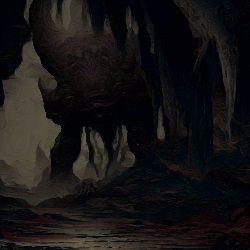 "The Beast in the Cave," a tale of eerie proportions, was penned by the esteemed chronicler of horror, H.P. Lovecraft, in the year 1905, when he was but a lad of fourteen winters. It was not until the year 1918 that this unsettling narrative was first unveiled to the unsuspecting public. Within its confines, the reader is regaled with the account of a hapless soul who, having become astray in a subterranean labyrinth, is confronted by a being of enigmatic and sinister origin.
"The Beast in the Cave," a tale of eerie proportions, was penned by the esteemed chronicler of horror, H.P. Lovecraft, in the year 1905, when he was but a lad of fourteen winters. It was not until the year 1918 that this unsettling narrative was first unveiled to the unsuspecting public. Within its confines, the reader is regaled with the account of a hapless soul who, having become astray in a subterranean labyrinth, is confronted by a being of enigmatic and sinister origin.

Among the spectral fragments of H.P. Lovecraft's literary oeuvre, one finds the shimmering specter of "The White Ship" (1919) gliding hauntingly upon the misty currents of his early works. Composed during Lovecraft's self-described "Dream Cycle", this story drifts far from the realm of the grotesque and monstrous, nestling instead into a somewhat idyllic, albeit ethereal, realm of dream-forged fantasy.
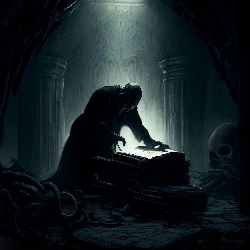 Among the dolorous and eldritch annals of weird literature, few names evoke the same profound sense of cosmic horror and otherworldly dread as that of the late Howard Phillips Lovecraft. Among the pantheon of his literary creations, "The Statement of Randolph Carter" serves as a chilling testament to Lovecraft's macabre genius, showcasing his uncanny ability to weave tales of abject terror that haunt the reader's fevered imagination long after the final page has been turned.
Among the dolorous and eldritch annals of weird literature, few names evoke the same profound sense of cosmic horror and otherworldly dread as that of the late Howard Phillips Lovecraft. Among the pantheon of his literary creations, "The Statement of Randolph Carter" serves as a chilling testament to Lovecraft's macabre genius, showcasing his uncanny ability to weave tales of abject terror that haunt the reader's fevered imagination long after the final page has been turned.
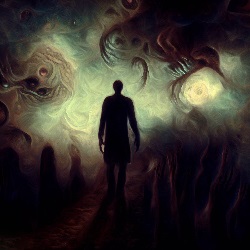 Amidst the unfathomable depths of the cosmos and the intricate labyrinth of the human psyche, lies a tale of mystifying darkness and cosmic revelation: "Beyond the Wall of Sleep." This intriguing work, penned by the inimitable Howard Phillips Lovecraft and first published in the October 1919 issue of Pine Cones, stands as a testament to the author's extraordinary ability to meld science, horror, and the exploration of the human mind. In this essay, I shall endeavor to dissect this enigmatic tale and compare it to Lovecraft's greater corpus, drawing upon the erudite analyses of esteemed scholars, and providing a comprehensive review of this chilling tale.
Amidst the unfathomable depths of the cosmos and the intricate labyrinth of the human psyche, lies a tale of mystifying darkness and cosmic revelation: "Beyond the Wall of Sleep." This intriguing work, penned by the inimitable Howard Phillips Lovecraft and first published in the October 1919 issue of Pine Cones, stands as a testament to the author's extraordinary ability to meld science, horror, and the exploration of the human mind. In this essay, I shall endeavor to dissect this enigmatic tale and compare it to Lovecraft's greater corpus, drawing upon the erudite analyses of esteemed scholars, and providing a comprehensive review of this chilling tale.
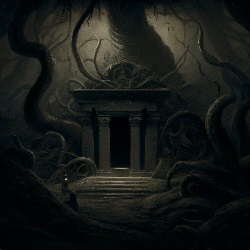 In the cold, dark recesses of the literary catacombs, one may stumble upon a tale of ghastly grandeur and spectral fascination, penned by none other than the master of eldritch horror, H.P. Lovecraft. It is a tale known as "The Tomb" (1917), which stands as a testament to Lovecraft's early forays into the macabre and the supernatural. The prose, shrouded in an archaic veil and adorned with the ornamentation of the Gothic, beckons the reader into the sepulchral depths of a world beyond the mundane.
In the cold, dark recesses of the literary catacombs, one may stumble upon a tale of ghastly grandeur and spectral fascination, penned by none other than the master of eldritch horror, H.P. Lovecraft. It is a tale known as "The Tomb" (1917), which stands as a testament to Lovecraft's early forays into the macabre and the supernatural. The prose, shrouded in an archaic veil and adorned with the ornamentation of the Gothic, beckons the reader into the sepulchral depths of a world beyond the mundane.
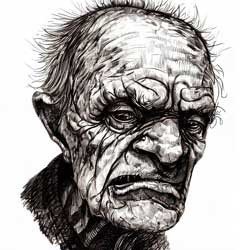 In the abundant and convoluted corridors of literary discourse, the spectre of Howard Phillips Lovecraft looms large, a figure both revered and reviled. His tales of cosmic horror, teeming with eldritch abominations and the existential dread of the unknown, have left an indelible mark on the genre. Yet, the shadow of his virulent racism and xenophobia taints this legacy, a disquieting reminder of the prejudices that were all too common in his era.
In the abundant and convoluted corridors of literary discourse, the spectre of Howard Phillips Lovecraft looms large, a figure both revered and reviled. His tales of cosmic horror, teeming with eldritch abominations and the existential dread of the unknown, have left an indelible mark on the genre. Yet, the shadow of his virulent racism and xenophobia taints this legacy, a disquieting reminder of the prejudices that were all too common in his era.






